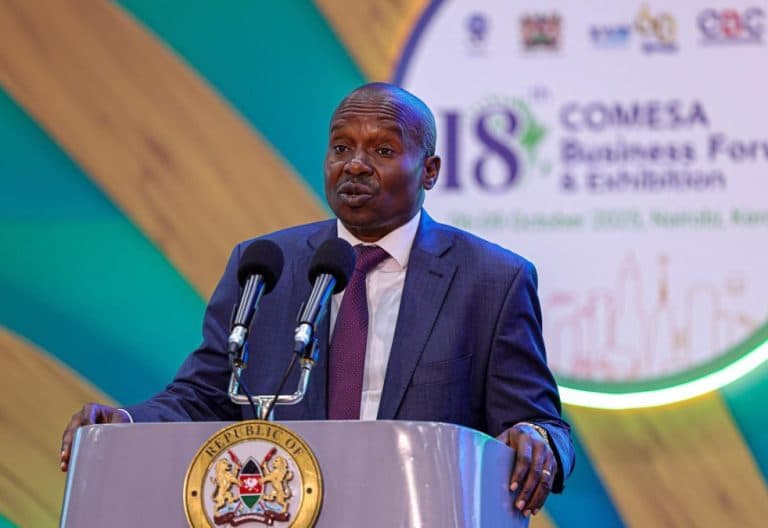We're loading the full news article for you. This includes the article content, images, author information, and related articles.
Deputy President Kithure Kindiki’s declaration of loyalty signals a highly centralized executive, a stark departure from the public friction that has defined Kenya's previous presidencies and raised new questions about the constitutional balance of power.

NAIROBI, Kenya - Deputy President Kithure Kindiki has unequivocally affirmed that his official schedule and duties are determined solely by President William Ruto, a statement that starkly defines the power dynamics within the current executive. Speaking during a church service in Kapsabet, Nandi County, on Sunday, November 16, 2025, Kindiki emphasized his role as a subordinate officer whose mandate is to execute the President's directives.
“In this office, I do not have my own diary. My diary depends on the President's diary,” Kindiki told the congregation. He explained that his attendance at the event was a direct instruction from the Head of State. “Do not praise me for being here. Thank the President, because he is the one who said I should come here today.”
The declaration, while framed as a statement of loyalty, provides critical insight into the operational style of the Kenya Kwanza administration. It suggests a tightly controlled, top-down command structure, consciously designed to avoid the public discord and power struggles that plagued the relationship between former President Uhuru Kenyatta and then-Deputy President William Ruto.
Kenya has a long and turbulent history of strained relationships between its presidents and their deputies. From the ideological fallout between Jomo Kenyatta and his first Vice President, Jaramogi Oginga Odinga, to the acrimonious second term of the Uhuru-Ruto administration, the presidency has often been a site of internal rivalry. The 2010 Constitution sought to remedy this by making the Deputy President a running mate elected on a joint ticket, theoretically insulating them from arbitrary dismissal by the President.
However, the recent impeachment of Kindiki's predecessor, Rigathi Gachagua, demonstrated that even constitutional safeguards do not guarantee a harmonious relationship. Political analysts suggest that Kindiki's public posture is a deliberate strategy to project stability and unwavering allegiance, a quality President Ruto has openly prioritized. In April 2025, President Ruto publicly praised Kindiki as “respectful, hardworking, and committed,” noting that his disciplined approach had made the President's work easier.
Under Article 147 of the Constitution of Kenya, the Deputy President is the principal assistant to the President and is mandated to deputise for the President in the execution of their functions. The constitution explicitly states the DP shall perform functions conferred by the constitution and “any other functions as the President may assign.”
Kindiki’s statement places a heavy emphasis on the latter part of this provision. While constitutionally sound, this interpretation centralizes executive authority significantly. According to political analyst Herman Manyora, a deputy president in Kenya has few clearly defined constitutional functions, ultimately serving at the pleasure of the president who assigns their responsibilities. This dynamic positions Kindiki as a key implementer of the President's agenda, from championing legislative priorities like the Infrastructure Fund Bill to leading agricultural reforms.
This approach contrasts sharply with that of his predecessor, whose combative style often generated public controversy. Political analyst Dismas Mokua has noted that Kindiki's calm, technocratic style offers the administration a chance to rebrand its public image and project authority with greater credibility.
A fully aligned Deputy President can lead to more efficient implementation of government policy and a unified public message. Kindiki has been at the forefront of key government initiatives, including representing Kenya at the COP30 climate summit in Brazil and coordinating follow-ups on development projects nationwide. His role is to be the President's loyal defender and ensure directives are executed without the political sideshows of the past.
However, this dynamic also raises questions about internal checks and balances within the executive. Critics, whom Kindiki has dismissed as detractors, have labeled him a “yes-man,” a charge he refutes by arguing that loyalty is essential for effective governance. “I'm not stupid, I know what I'm doing. You must be loyal to the President to get things done,” Kindiki stated in April 2025.
As the administration moves past its midterm, this centralized power structure will be tested. Kindiki's performance and unwavering loyalty are seen as crucial for consolidating President Ruto's support base, particularly in the Mount Kenya region, ahead of the 2027 general election. His statement in Nandi was not just a declaration of personal fealty; it was a clear message to the nation about the unified and hierarchical nature of the current presidency, where the President's diary is, for all intents and purposes, the only diary that matters.
Keep the conversation in one place—threads here stay linked to the story and in the forums.
Sign in to start a discussion
Start a conversation about this story and keep it linked here.
Other hot threads
E-sports and Gaming Community in Kenya
Active 9 months ago
The Role of Technology in Modern Agriculture (AgriTech)
Active 9 months ago
Popular Recreational Activities Across Counties
Active 9 months ago
Investing in Youth Sports Development Programs
Active 9 months ago
Key figures and persons of interest featured in this article